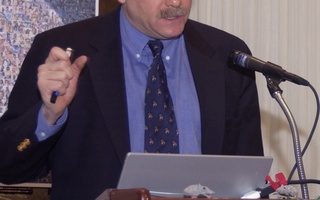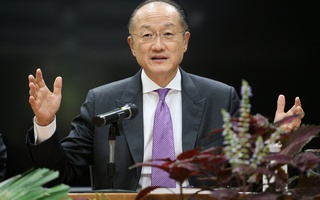{shortcode-589d76c2238df22cdcacd21e27175db47bae483f}Harvard Medical School Dean George Q. Daley ’82 said Harvard’s next president should have a background in science and listed several life scientists he “expects” to see on the search committee’s candidate shortlist in an interview last month.
Since University President Drew G. Faust announced her plans to step down in June, a presidential search committee—comprising all 12 members of the Harvard Corporation and three members of the Board of Overseers—has worked with two advisory committees to gather input from Harvard affiliates in Cambridge and beyond. In recent weeks, the search committee narrowed its list of candidates to fewer than 20 names, according to individuals with knowledge of the search.
Daley said he expects many life scientists made this under-20 list. Specifically, he said he thinks geneticist and Broad Institute President Eric S. Lander, physician and University of Michigan President Mark S. Schlissel, World Bank President and former Dartmouth President Jim Yong Kim, and Harvard Provost Alan M. Garber ’77 are on the list.
“Eric Lander, one of the great leaders of the Broad Institute, is almost certainly on that shortlist,” Daley said.
He added that Garber, who several alumni and professors have already pointed to as a likely candidate, would make a “spectacular future president.”
Daley said he does not have direct knowledge of the search, though he has been formally and informally consulted by the search committee. He said he has made his “strong opinions” well known.
“I feel very passionately that we would be very well served in the future to have a scientist as president. I would love to see it be a life scientist,” said Daley, a prominent stem cell researcher.
William F. Lee ’72, the senior fellow of the Corporation who chairs the search committee, did not respond to a request for comment. He has repeatedly declined to comment on the number or identity of candidates the committee is considering.
Lander, 59, spearheaded the Human Genome Project and served as a scientific adviser to former President Barack Obama. He helped found the Broad Institute, a joint venture between Harvard and MIT for genetic research applied to medicine.
This is not the first time Lander has been mentioned as a potential Harvard president. The geneticist made the 2007 search committee’s shortlist in the University’s previous search for its 28th president, The Crimson reported in Jan. 2007.
Schlissel has served as president of the University of Michigan for roughly three years. Prior to that, he served as the provost of Brown University and before that as the dean of biological sciences at the University of California Berkeley. Schlissel, 60, holds various professorships in fields including microbiology in addition to the presidency.
Kim, 58, is a physician and anthropologist; he has served as the president of the World Bank since 2012. He has strong Harvard ties—in addition to earning an M.D./Ph.D. from the Medical School, he previously held the chairship of the department of global health and social medicine at the school.
When he assumed the presidency of Dartmouth in 2009, Kim became the first Asian American to serve as president of an Ivy League institution.
Multiple Harvard donors have called Garber a strong contender for the presidency. Garber taught medicine and economics for two-and-a-half decades at Stanford before returning to Harvard; he took on the provostship in 2011.
Garber, 62, currently serves as a professor of health care policy at the Medical School, studying methods for improving health care productivity and financing.
Lander, Schlissel, Kim, and Garber did not respond to requests for comment.
More than half a century has elapsed since Harvard has seen a scientist president: Chemist James Bryant Conant, who served as the University’s 23rd president from 1933 to 1953, was the most recent scientist to occupy the corner office of Massachusetts Hall.
As Harvard establishes an engineering campus in Allston, which Daley called a “hub of biotechnology innovation in the future,” Daley said that he “would love to see a greater emphasis on life science” moving forward.
“The importance of life sciences can’t be overstated for the future of not only Harvard University, but the greater Boston region and the future of the United States,” he said.
—Staff writer William L. Wang can be reached at william.wang@thecrimson.com. Follow him on Twitter @wlwang20Recommended Articles
-
Football Team Is Losing AlreadyThe smiling-faced optimists who had picked the Harvard football team for as high as fifth place in the Ivy League
-
NINE SENIORS ASKED TO HARVARD CLUBS' DINNERThe Associated Harvard Clubs of New England have invited nine University Seniors to their banquet to be held tomorrow night
-
 Possible Pres. Contender Lander Dismisses Speculation
Possible Pres. Contender Lander Dismisses Speculation -
 Kim in Contact with Search Committee, Mulling Top Job
Kim in Contact with Search Committee, Mulling Top Job -
 Faust Confers 1,533 College Degrees at 367th Commencement
Faust Confers 1,533 College Degrees at 367th Commencement













